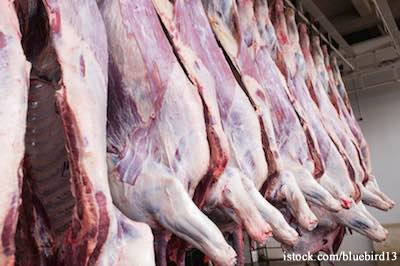 The European Union has officially rejected Australia’s privatized meat inspection system, according to a report released of the May 2012 audit. Australia’s system, called the Australian Export Meat Inspection System (AEMIS) was implemented in September 2011. It was judged to be not in compliance with EU food safety regulations.
The European Union has officially rejected Australia’s privatized meat inspection system, according to a report released of the May 2012 audit. Australia’s system, called the Australian Export Meat Inspection System (AEMIS) was implemented in September 2011. It was judged to be not in compliance with EU food safety regulations.
The European Commission audit staff said that using company-paid inspectors to perform inspection of animal carcasses was a conflict of interest. The report states that “Australian Government Authorised Officers (AAOs) who are directly paid and employed by the food business operators did not meet the legal interpretation of an ‘official auxiliary’. The competency of AAOs was not questioned.” The Australian Department of Agriculture, Fisheries and forestry told the European Commission it was going to implement a new inspection procedure to avoid the conflict of interest.
Wenonah Hauter, executive director of Food & Water Watch, said this confirms that agency’s earlier opinion. “European regulators have made the right call by rejecting Australia’s privatized meat inspeciton scheme. It’s time that U.S. regulators also reject a food safety regime where companies basically inspect themselves,” she said in a statement.
The USDA granted equivalency status to AEMIS in March 2011. That decision was based only on results from one Australian beef slaughter plant that was using the new inspection system. USDA is in the process of approving similar inspection schemes of privatized models in this country, called HACCP-based Inspection Models Project (HIMP), based on pilot projects in five hog slaughter plants. This summer, the USDA Office of the Inspector General and the U.S. Government Accountability Office issued very critical reports questioning those pilot projects and HIMP.
In October 2013, Food & Water Watch sent a letter to USDA Secretary Tom Vilsack, asking about problems with imported meat products from Australian and Canada and equivalency statuses of those country’s programs. Since 2012, when AEMIS was fully implemented, the number of rejected imports of red meat shipments from Australia have dramatically increased. That letter also expresses concerns about the Canadian meat inspection system.
Ms. Hauter continues, “Food & Water Watch, again, calls on USDA to revisit the equivalency determination it made regarding AEMIS. The determination was flawed since it was based on a pilot project – not the entire meat inspection system here in the U.S. In addition, the pilot project in hog slaughter upon which the equivalency determination was made has never been fully evaluated by FSIS.”




